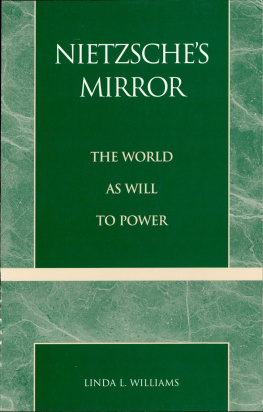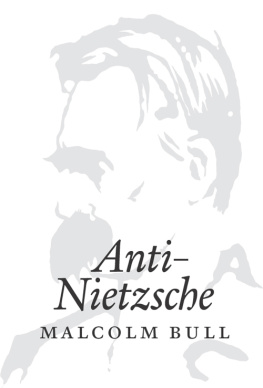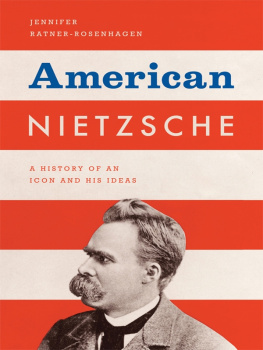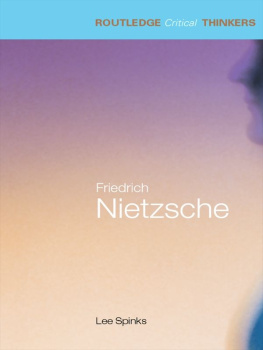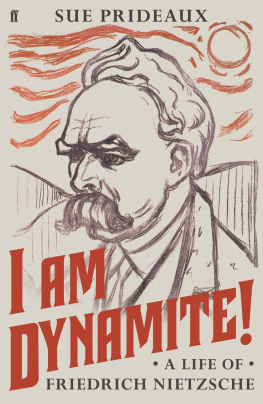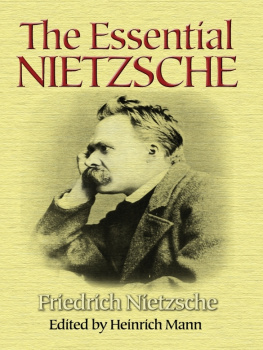Nietzsche Friedrich Wilhelm - Ecce homo: how one becomes what one is
Here you can read online Nietzsche Friedrich Wilhelm - Ecce homo: how one becomes what one is full text of the book (entire story) in english for free. Download pdf and epub, get meaning, cover and reviews about this ebook. City: UK;Oxford;Germany, year: 2003;2007, publisher: Oxford University Press, genre: Religion. Description of the work, (preface) as well as reviews are available. Best literature library LitArk.com created for fans of good reading and offers a wide selection of genres:
Romance novel
Science fiction
Adventure
Detective
Science
History
Home and family
Prose
Art
Politics
Computer
Non-fiction
Religion
Business
Children
Humor
Choose a favorite category and find really read worthwhile books. Enjoy immersion in the world of imagination, feel the emotions of the characters or learn something new for yourself, make an fascinating discovery.

- Book:Ecce homo: how one becomes what one is
- Author:
- Publisher:Oxford University Press
- Genre:
- Year:2003;2007
- City:UK;Oxford;Germany
- Rating:5 / 5
- Favourites:Add to favourites
- Your mark:
- 100
- 1
- 2
- 3
- 4
- 5
Ecce homo: how one becomes what one is: summary, description and annotation
We offer to read an annotation, description, summary or preface (depends on what the author of the book "Ecce homo: how one becomes what one is" wrote himself). If you haven't found the necessary information about the book — write in the comments, we will try to find it.
Nietzsche Friedrich Wilhelm: author's other books
Who wrote Ecce homo: how one becomes what one is? Find out the surname, the name of the author of the book and a list of all author's works by series.
Ecce homo: how one becomes what one is — read online for free the complete book (whole text) full work
Below is the text of the book, divided by pages. System saving the place of the last page read, allows you to conveniently read the book "Ecce homo: how one becomes what one is" online for free, without having to search again every time where you left off. Put a bookmark, and you can go to the page where you finished reading at any time.
Font size:
Interval:
Bookmark:
OXFORD WORLDS CLASSICS
For over 100 years Oxford Worlds Classics have brought readers closer to the worlds great literature. Now with over 700 titlesfrom the 4,000-year-old myths of Mesopotamia to the twentieth centurys greatest novelsthe series makes available lesser-known as well as celebrated writing.
The pocket-sized hardbacks of the early years contained introductions by Virginia Woolf, T. S. Eliot, Graham Greene, and other literary figures which enriched the experience of reading. Today the series is recognized for its fine scholarship and reliability in texts that span world literature, drama and poetry, religion, philosophy, and politics. Each edition includes perceptive commentary and essential background information to meet the changing needs of readers.
Refer to the to navigate through the material in this Oxford Worlds Classics ebook. Use the asterisks (*) throughout the text to access the hyperlinked Explanatory Notes.
OXFORD WORLDS CLASSICS
ECCE HOMO
FRIEDRICH NIETZSCHE (18441900) was born in Rcken, Saxony, and educated at the universities of Bonn and Leipzig. At the age of only 24 he was appointed Professor of Classical Philology at the University of Basle, but prolonged bouts of ill health forced him to resign from his post in 1879. Over the next decade he shuttled between the Swiss Alps and the Mediterranean coast, devoting himself entirely to thinking and writing. His early books and pamphlets (The Birth of Tragedy, Untimely Meditations) were heavily influenced by Wagner and Schopenhauer, but from Human, All Too Human (1878) on, his thought began to develop more independently, and he published a series of ground-breaking philosophical works (The Gay Science, Thus Spoke Zarathustra, Beyond Good and Evil, On the Genealogy of Morals) which culminated in a frenzy of production in the closing months of 1888. In January 1889 Nietzsche suffered a mental breakdown from which he was never to recover, and he died in Weimar eleven years later. Ecce Homo (1888) is a mischievously provocative autobiography, a blasphemous exercise in self-styling in which he reviews his life and work from a divine perspective of absolute affirmation.
DUNCAN LARGE, former Chairman of the Friedrich Nietzsche Society, is Reader in German at Swansea University. He has translated Nietzsches Twilight of the Idols for Oxford Worlds Classics (1998) and co-edited (with Keith Ansell Pearson) The Nietzsche Reader (Blackwell, 2005). He is the author of Nietzsche and Proust: A Comparative Study (Oxford University Press, 2001) and is currently completing a monograph on Nietzsches Renaissance Figures.
OXFORD WORLDS CLASSICS

FRIEDRICH NIETZSCHE
How To Become What You Are

Translated with an Introduction and Notes by
DUNCAN LARGE


Great Clarendon Street, Oxford OX2 6DP
Oxford University Press is a department of the University of Oxford.
It furthers the Universitys objective of excellence in research, scholarship,
and education by publishing worldwide in
Oxford New York
Auckland Cape Town Dar es Salaam Hong Kong Karachi
Kuala Lumpur Madrid Melbourne Mexico City Nairobi
New Delhi Shanghai Taipei Toronto
With offices in
Argentina Austria Brazil Chile Czech Republic France Greece
Guatemala Hungary Italy Japan Poland Portugal Singapore
South Korea Switzerland Thailand Turkey Ukraine Vietnam
Oxford is a registered trade mark of Oxford University Press
in the UK and in certain other countries
Published in the United States
by Oxford University Press Inc., New York
Duncan Large 2007
The moral rights of the author have been asserted
Database right Oxford University Press (maker)
First published as an Oxford Worlds Classics paperback 2007
All rights reserved. No part of this publication may be reproduced, stored in a retrieval system, or transmitted, in any form or by any means, without the prior permission in writing of Oxford University Press, or as expressly permitted by law, or under terms agreed with the appropriate reprographics rights organization. Enquiries concerning reproduction outside the scope of the above should be sent to the Rights Department, Oxford University Press, at the address above
You must not circulate this book in any other binding or cover
and you must impose this same condition on any acquirer
British Library Cataloging in Publication Data
Data available
Library of Congress Cataloging in Publication Data
Nietzsche, Friedrich Wilhelm, 18441900.
[Ecce homo. English]
Ecce homo : how to become what you are / Friedrich Nietzsche ; translated
with an introduction and notes by Duncan Large.
p. cm.
Includes bibliographical references and index.
ISBN-13: 9780192832283 (alk. paper)
1. Nietzsche, Friedrich Wilhelm, 18441900. 2. PhilosophersGermany
Biography. I. Large, Duncan. II. Title.
B3316.N54A3413 2007
193dc22
2006039681
Typeset by Cepha Imaging Private Ltd., Bangalore, India
Printed in Great Britain
on acid-free paper by
Clays Ltd, St Ives plc
ISBN 9780192832283
13579 10 8642
TO THE MEMORY OF
SARAH KOFMAN
19341994
Cross-references within Ecce Homo are by chapter and paragraph number, with the chapters referred to in abbreviated form as follows:
F: Foreword
I: Why I Am So Wise
II: Why I Am So Clever
III: Why I Write Such Good Books
IV: Why I Am a Destiny
References to Nietzsches other works are also by paragraph number, except for the correspondence and the unpublished notes not collected in The Will to Power, where volume and page references to the German editions are given. The following are the abbreviations used and the editions from which illustrative quotations have been taken:
AC | The Antichrist (1888), in Twilight of the Idols and The Anti-Christ, trans. R. J. Hollingdale (Harmondsworth: Penguin,1968) |
BAW | Friedrich Nietzsche: Frhe Schriften, ed. Hans Joachim Mette, Karl Schlechta, and Carl Koch, 2nd edn., 5 vols. (Munich: Beck, 1994) |
BGE | Beyond Good and Evil (1886), trans. Marion Faber (Oxford and New York: Oxford University Press, 1998) |
BT | The Birth of Tragedy (1872), trans. Douglas Smith (Oxford and New York: Oxford University Press, 2000) |
D | Daybreak (1881), trans. R. J. Hollingdale (Cambridge: Cambridge University Press, 1982) |
GM | On the Genealogy of Morals (1887), trans. Douglas Smith (Oxford and New York: Oxford University Press, 1996) |
GS | The Gay Science (18827), trans. Walter Kaufmann (New York: Vintage, 1974) |
HA | Human, All Too Human (187880), trans. R. J. Hollingdale (Cambridge: Cambridge University Press, 1986) |
Font size:
Interval:
Bookmark:
Similar books «Ecce homo: how one becomes what one is»
Look at similar books to Ecce homo: how one becomes what one is. We have selected literature similar in name and meaning in the hope of providing readers with more options to find new, interesting, not yet read works.
Discussion, reviews of the book Ecce homo: how one becomes what one is and just readers' own opinions. Leave your comments, write what you think about the work, its meaning or the main characters. Specify what exactly you liked and what you didn't like, and why you think so.

